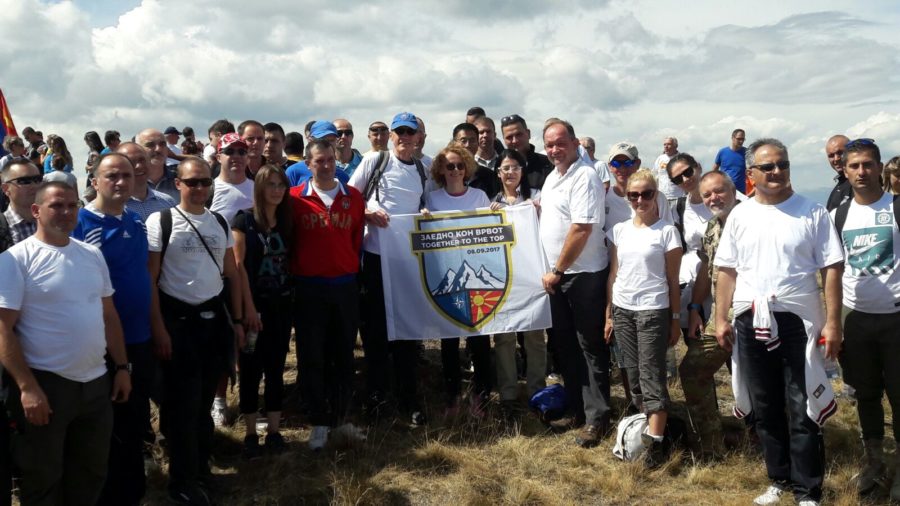10th September 2017 Skopje, North Macedonia
We need to talk about NATO in Macedonia

I spent Macedonia’s Independence Day climbing Bushava mountain, a stunningly beautiful peak near Krushevo with 360-degree views. I wasn’t alone – some 200 of us had joined up at the invitation of the Ministry of Defence and the NATO Liaison Office in Skopje. In inviting us to Krushevo, they were looking for a different way to mark Independence Day. And they certainly found it – it was somehow absolutely right to celebrate Macedonia’s Independence while totally surrounded by the country’s natural beauty. It was a wonderful addition to the speeches and receptions I attended the previous day.
The climb, ‘Together to the top’, was also imbued with powerful symbolism. It brought together people from the world of defence – serving army officers and Ministry officials – citizens, diplomats and others, in a display of all the qualities needed to achieve any goal: vision, good organisation, collaboration, determination. I don’t think any participant missed the point that, just as our group of 200 needed those qualities to climb Bushava, the Republic of Macedonia will need them on its continuing journey towards NATO.
There has been a real buzz in recent weeks about Macedonia’s ambition to join the Alliance. Much of that flows from the new coalition government’s concerted effort to strengthen good neighbourly relations and has shown determination in its approach to reform. It is still early days, but those efforts and determination are a really strong start.
And I hope they pay off. The UK, like other NATO allies, has a core interest in the Western Balkans built around strengthening security and stability here. We share the Macedonian government’s view that joining NATO will make a big contribution to greater security and stability in Europe. We will continue to support Macedonia’s efforts to achieve that. Most recently, we agreed a collaboration under which British experts will support Macedonia’s Strategic Defence Review.
It is worth looking back at what NATO is, and why the Alliance and Macedonia would both benefit from Macedonian accession.
NATO was founded in 1949 with the signing of the North Atlantic Treaty by 12 founding members, one of them being the UK. That treaty is itself based in Article 51 of the United Nations Charter, which reaffirms the inherent right of independent states to individual or collective defence. After almost seven decades, this is an intergovernmental organisation that has stood the test of time and retained its principles, structure, operation and effectiveness. It has shown the resilience and flexibility required to adapt to the seismic geopolitical changes that continue to shape our world. And through all of this, NATO has retained its founding principles, in particular that membership means belonging to a unique community of nations committed to individual liberty, democracy, human rights and the rule of law.
While those principles make for a strong foundation, NATO’s continuing strength demands solidarity. Macedonia has already, through its remarkable deployments to ISAF in Afghanistan among others, demonstrated that sense of solidarity.
But what is in it for Macedonia? The broad answer lies in our two countries’ shared interest in security and stability. Together we are stronger, sharing our responsibilities and sharing the benefits that the Alliance brings us. Macedonia decided more than two decades ago to join NATO. And that is a policy that enjoys high public support here in Macedonia.
The arguments in favour remain as strong today as they were 20 years ago. But it is always good to see an upsurge in the public debate, such as there has been recently, about membership. All policies, especially ones of such significance to the country, benefit from continuing dissection of the detailed pros and cons. Why and how should Macedonia become a NATO member? How much would it cost and what would Macedonia gain in return? How would membership in a collective defence organisation influence the lives of people at home – how would it affect the man or woman on the street? What resources could Macedonia pool and share with its future Allies?
This is an important debate which we are happy to support. #It’sGoodToTalk

NATO can not function. Relations with Russia are weak. It should be developed. What are you thinking?